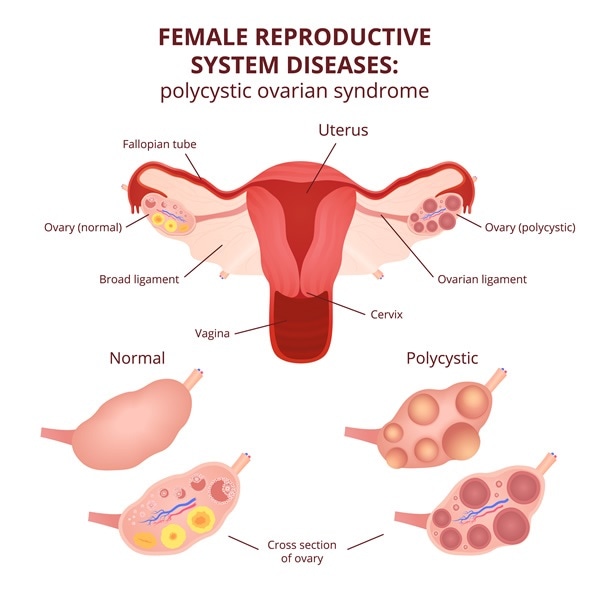There is no cure for polycystic ovary syndrome (PCOS), but the symptoms of the condition can be managed to improve the quality of life. This article outlines the general lifestyle modifications suitable for all women with PCOS, in addition to symptom-specific treatment options for the condition.

Female reproductive system, the uterus and ovaries scheme, polycystic ovary syndrome, ovarian cyst - Image Copyright: Marochkina Anastasiia / Shutterstock
General Lifestyle Modifications
For women with PCOS, particularly those who are overweight or obese, there is a heightened risk of chronic health conditions such as diabetes and heart disease.
Encouraging healthy lifestyle choices can help these women to lose weight and reduce their risk of the health conditions and associated complications. In fact, even just a 5% reduction in weight can have significant health benefits for the woman.
Lifestyle modifications that should form a part of the treatment plan for a woman with PCOS should include:
- Regular exercise
- Nutritious diet with high intake of vegetables
- Avoidance of smoking
- Moderation of alcohol
Irregular Menstrual Periods
Oral contraceptive pills may help induce regular periods for women who have an irregular or absent menstrual cycle. Progesterone-only tablets can also be given intermittently to induce a period. This encourages the shedding of the endometrial lining and reduces the long-term risk of endometrial cancer. Other contraceptive methods (e.g., intrauterine system) can also lower the risk of cancer by maintaining a thin endometrial lining.
Fertility
Infertility or difficulty conceiving a child is a common reason for PCOS to be diagnosed. With the appropriate treatment, most women with the condition are able to become pregnant successfully. Prior to utilizing any of the following treatments, it is important that other possible causes of infertility, such as blocked fallopian tubes, are investigated.
In most cases, a short course of clomifeneat the beginning of each menstrual cycle to encourage ovulation for several months is sufficient to enable the woman to become pregnant. Metformin is a medication usually indicated in Type 2 diabetes mellitus that is also sometimes used to stimulate ovulation and lower the risk of miscarriage in women with PCOS.
If oral medications are not effective, gonadotropins given by injection may help to stimulate ovulation. This is recommended as a second-line treatment as there is an increased risk of overstimulation of the ovaries and multiple pregnancies.
Alternatively, laparoscopic ovarian drilling (LOD) is another method that can be equally effective as gonadotropin treatment but does not carry an increased risk of multiple pregnancies. This is a surgical procedure performed under general anesthetic that involves the application of heat or lasers to the ovarian tissues that is producing androgens, correcting the hormonal imbalance and restoring normal function to the ovaries. Some women may require in-vitro fertilization (IVF) to conceive.
Hirsutism
There are several medications that can be used to control excessive hair growth associated with PCOS, including:
- Cyproterone acetate
- Spironolactone
- Flutamide
- Finasteride
- Some types of oral contraceptive pills
These medications can inhibit the effects and suppress the production of androgen hormones, which are primarily responsible for these symptoms.
Eflornithine can be formulated as a cream for topical use and applied to the face to help slow the growth of unwanted facial hair. This usually takes one to two months to begin working. However, the efficacy is limited and other methods (e.g., plucking, shaving, or laser removal) may also be required.
References
Further Reading
Last Updated: Feb 27, 2019